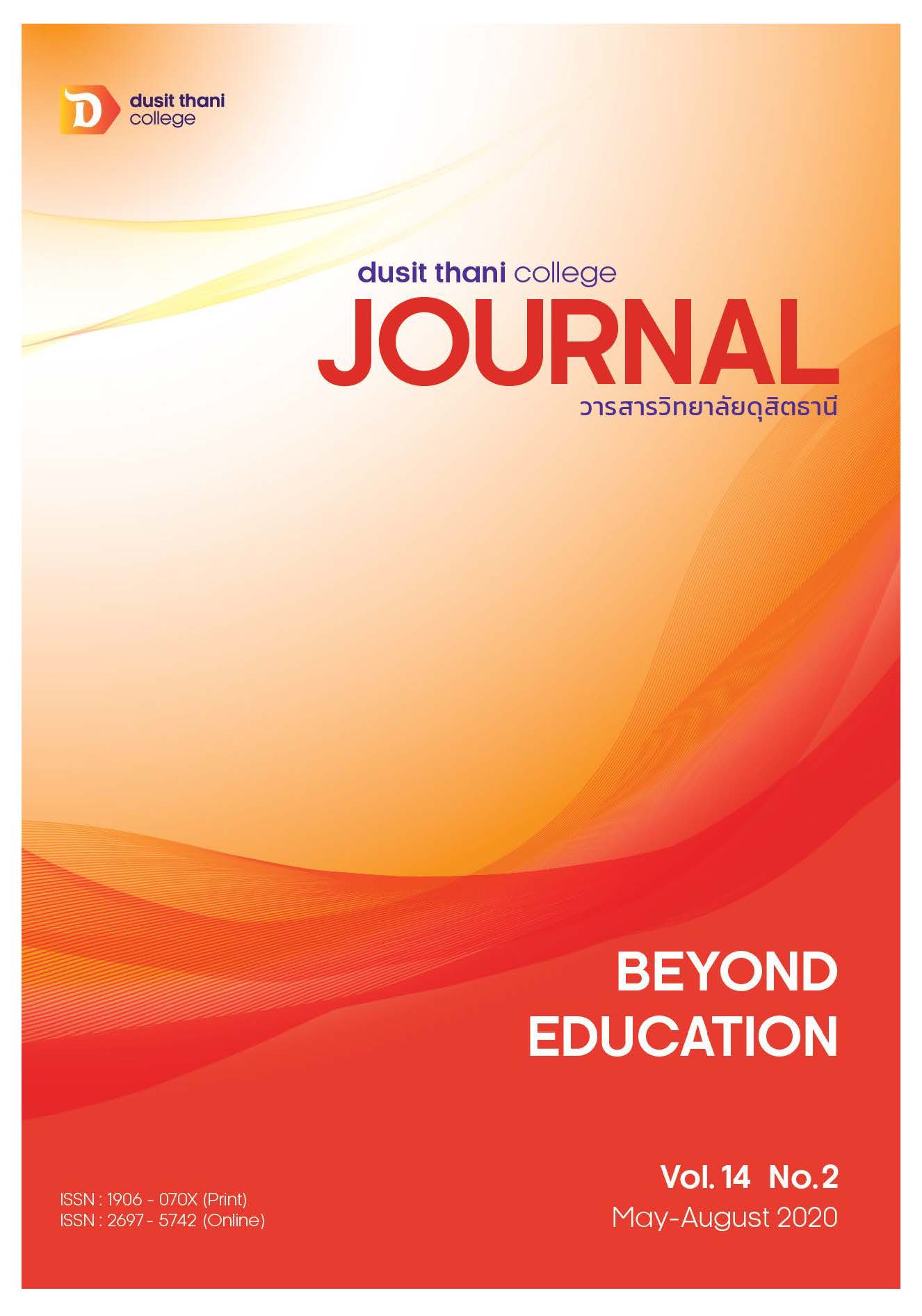The Effect of Value Co-creation Behavior on Satisfaction and Brand Image of Higher Education Institutions in The Hospitality Industry
Main Article Content
Abstract
The purposes of this research are as follows: 1) to study the level of value co-creation behavior of students in higher education institutions in the hospitality industry and 2) to study the effect of value co-creation behavior on student satisfaction and the image of higher education institutions in the hospitality industry. The research instruments is using 5-level rating scales questionnaire consisting of a questionnaire for value co-creation behavior, higher education institute’s students’ satisfaction, and higher education institute image. The samples consist of 558 hospitality industry students, including students from Culinary Art Management, Hotel Management, and Mice Management. Data were analyzed by using descriptive statistics and structural equation modeling (SEM).
The findings are summarized as follows.
- Hospitality industry students have a high level of value co-creation behavior ( =3.89) with customer participation behavior and customer citizenship behavior at a high level ( =3.97, 3.82 respectively). When considered in each factor found that the personal interaction has the highest value ( =4.25), followed by responsible behavior and helping is also at the same high level ( =4.04, 3.99 respectively). The lowest factor is tolerance ( =3.49)
- The value co-creation behavior of students in the hospitality industry has a statistically significant effect on student satisfaction and higher education institute image. The percentage of the variance can be explained by 63 and 77 respectively. In addition, student satisfaction also has a statistical effect on the image of higher education institutions.
Article Details
Article Screening Policy
- All research and academic articles to be published must be considered and screened by three peer reviews in the relevant field / article.
- All articles, texts, illustrations and tables published in the journal are the personal opinions of the authors. Editors don't always have to agree. And no responsibility whatsoever is the sole responsibility of the author.
- The articles to be published must never be published. Where did you first publish? And not in the consideration of other journals If the audit found that there has been a duplicate publication It is the sole responsibility of the author.
- Any article that the reader sees as being plagiarized or impersonated without reference. Or mislead the work of the author Please let the journal editor know it will be your greatest blessing.
References
Cabiddu, F., Lui, T. W., & Piccoli, G. (2013). Managing value co-creation in the tourism industry. Annals of Tourism Research, 42, 86-107.
Dann, S. (2008). Adaptation and adoption of the American Marketing Association (2007) definition for social marketing. Social Marketing Quarterly, 14(2), 92-100.
De Silva, M., & Rossi, F. (2018). The effect of firms' relational capabilities on knowledge acquisition and co-creation with universities. Technological Forecasting and Social Change, 133, 72-84.
Elsharnouby, T. H. (2015). Student co-creation behavior in higher education: the role of satisfaction with the university experience. Journal of Marketing for Higher Education, 25(2), 238-262.
Faham, E., Rezvanfar, A., Mohammadi, S. H. M., & Nohooji, M. R. (2017). Using system dynamics to develop education for sustainable development in higher education with the emphasis on the sustainability competencies of students. Technological Forecasting and Social Change, 123, 307-326.
Foroudi, P., Yu, Q., Gupta, S., & Foroudi, M. M. (2019). Enhancing university brand image and reputation through customer value co-creation behavior. Technological Forecasting and Social Change, 138, 218-227.
Grissemann, U. S., & Stokburger-Sauer, N. E. (2012). Customer co-creation of travel services: The role of company support and customer satisfaction with the co-creation performance. Tourism management, 33(6), 1483-1492.
Grissemann, U. S., & Stokburger-Sauer, N. E. (2012). Customer co-creation of travel services: The role of company support and customer satisfaction with the co-creation performance. Tourism management, 33(6), 1483-1492.
Gundlach, G. T. (2007). The American Marketing Association's 2004 definition of marketing: Perspectives on its implications for scholarship and the role and responsibility of marketing in society. Journal of Public policy & marketing, 26(2), 243-250.
Hair, J. F., Black, W. C., Babin, B. J., & Anderson, R. E. (2009). Multivariate Data Analysis
7th ed. Pearson Prentice Hall.
Hatch, M.J. and Schultz, M. (2010), “Toward a theory of brand co-creation with implications for brand governance”, Journal of Brand Management, 17(8), 590-604
Kasemsan, K. (2010). The influence of university’s branding or reputation on customer loyalty: the case of communication arts and design department, KMITL. Arch Journal,
10(1): 1-15.
Phanthipha, P. et,al. (2018). Customer Value Co-Creation Behavior and Customer Brand Engagement Influencing on Customer Brand Loyalty of Furniture Decoration Business]. Journal of Business, Economics and Communications, 3(2), 136-154.
Prebensen, N. K., & Xie, J. (2017). Efficacy of co-creation and mastering on perceived value and satisfaction in tourists' consumption. Tourism Management, 60, 166-176.
Ranjan, K. R., & Read, S. (2016). Value co-creation: concept and measurement. Journal of the Academy of Marketing Science, 44(3), 290-315.
Vega-Vazquez, M., Ángeles Revilla-Camacho, M., & J. Cossío-Silva, F. (2013). The value co-creation process as a determinant of customer satisfaction. Management Decision, 51(10), 1945-1953 Schreiner, L. A. (2009). Linking student satisfaction and retention. Noel-Levitz, Coralville, IA.


